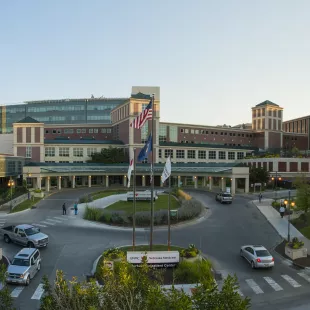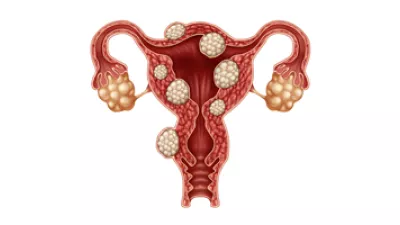Many women will have uterine fibroids sometime during their lives, but never know it. Uterine fibroids are the most common tumors of the female genital tract, affecting up to 3 out of 4 women. Fibroids are typically noncancerous and do not cause symptoms. However, in some women, they can become quite large, leading to pain and heavy bleeding, an increase in menstrual cramps, pelvic pain, pain in the back, flanks or legs, pain during intercourse, increased urination, pressure on the bowel, and an abnormally enlarged abdomen. The specialists at Nebraska Medicine can help you manage your condition, and if appropriate, eliminate your fibroids completely.
Why come to Nebraska Medicine for treatment of Uterine Fibroids?
We Treat Each Woman Individually
Approximately 40 percent of women that have symptoms will have fibroids, and about 20 percent of these women will require some form of surgery to treat the fibroids.
Specialists at Nebraska Medicine are experienced at diagnosing and treating fibroids, and knowing when you're just experiencing some of the symptoms of it. We know that uterine fibroids are different for every woman and that there is no cookie-cutter way to treat them. Our specialists look at each case individually, determine the pros and cons of treating them and then develop a plan of action based on your input.
Our Treatment Depends on Your Pregnancy Plans
Determining whether you should receive treatment and what type of treatment you have will depend on your age, severity of the symptoms and whether you still plan to have children. In some cases, the uterine fibroids may actually interfere with your ability to become pregnant. However, because of their location, procedures to remove the fibroids, such as a myomectomy, can be risky and could result in bleeding and damage to the ovaries. All of these factors will be taken into consideration.
We Offer a Variety of Treatments
Finding a solution that is the least invasive is our primary objective. If your symptoms are not disabling, you may want to wait it out. Most fibroids will shrink once you have reached menopause and oral contraceptives can help reduce heavy periods caused by fibroids in the meantime. However, if you are experiencing pain, heavy bleeding and even anemia and having children is not an issue, you may want to consider a hysterectomy to remove the uterus. This will provide a 100 percent cure.
Another option includes uterine artery embolization, a minimally invasive procedure that blocks the blood vessels that feed the fibroid tumor, causing them to shrink over time and alleviate symptoms. We have specialists with experience at performing this procedure.
We Have a Dedicated Women's Health Center
Designed specifically for women, the Olson Center for Women's Health is dedicated to meeting all of your women's health needs. For annual exams, digital mammograms, or serious concerns, you’ll see top doctors who are leaders in medicine and specialists in your particular condition.
Our Locations
-

Olson Center for Women's Health at Durham Outpatient Center
4400 Emile St.
Get Directions
Omaha, NE 68105
-
Olson Center obstetrics and gynecology services
Learn about the Olson Center's obstetrics and gynecology services.
View More

